African Countries Share Border With Indian Ocean
The Indian Ocean laps the shores of a diverse array of African countries, each with unique cultures, ecosystems, and histories shaped by their coastal location. These African Countries Share Border With Indian Ocean, offering a blend of stunning natural beauty and vibrant human life. Understanding which nations have coastlines on the Indian Ocean opens up a world of exploration into the continent’s rich tapestry.
Which countries in Africa share a border with the Indian Ocean? Let’s dive into a captivating journey exploring these coastal nations, their unique characteristics, and the significant influence of the Indian Ocean on their development.
Unveiling the Indian Ocean’s African Neighbors
The eastern coast of Africa is graced by the warm waters of the Indian Ocean. From the Horn of Africa down to the southern tip of the continent, a fascinating string of nations call this ocean their neighbor. These African countries share border with Indian Ocean, creating a crucial maritime link to the rest of the world. These countries are:
- Somalia
- Kenya
- Tanzania
- Mozambique
- South Africa
- Madagascar
- Comoros
- Seychelles
- Mauritius
Each of these countries boasts a unique relationship with the Indian Ocean, impacting their economies, cultures, and environments in distinct ways. The ocean has served as a pathway for trade, migration, and cultural exchange for centuries, shaping the identity of these coastal nations.
After this introduction, let’s delve into a closer look at the cultural influences shaped by the proximity to the Indian Ocean. You might find insights into traditional African Indian dressing fascinating. Read more about it at african indian dressing.
The Indian Ocean’s Influence on Culture and Trade
The Indian Ocean has played a pivotal role in shaping the cultures and economies of the African countries bordering it. Trade routes across the ocean have connected these nations to Asia, the Middle East, and Europe for centuries. This exchange has led to a fusion of cultures, evident in the architecture, cuisine, and languages of the coastal regions. From the Swahili language, a blend of Bantu and Arabic influences, to the vibrant spice markets of Zanzibar, the Indian Ocean’s impact is undeniable.
Biodiversity Hotspots Along the Coastline
The Indian Ocean’s warm currents create unique ecosystems along the African coastline, supporting an incredible diversity of marine life. Coral reefs teem with colorful fish, while mangrove forests provide vital habitats for various species. These coastal areas are biodiversity hotspots, crucial for maintaining the ecological balance of the region. The ocean’s influence extends beyond the shoreline, affecting weather patterns and creating diverse landscapes, from sandy beaches to lush rainforests.
“The Indian Ocean is not just a body of water; it’s a lifeline for the communities that depend on it,” says Dr. Abeni Adebayo, a renowned marine biologist specializing in East African ecosystems. “Its rich biodiversity is a treasure trove that needs to be protected for future generations.”
Do you want to know more about the different cultures across Africa? Check out african countries culture.
Facing the Challenges: Coastal Erosion and Climate Change
While the Indian Ocean brings numerous benefits, the coastal nations also face significant challenges. Rising sea levels due to climate change pose a threat to low-lying areas, increasing the risk of coastal erosion and flooding. Protecting these vulnerable communities and preserving the unique ecosystems along the coastline is a pressing concern. Sustainable development and international cooperation are crucial to addressing these issues.
Which African country borders the Red Sea and the Indian Ocean?
Somalia is the only African country that borders both the Red Sea and the Indian Ocean, giving it a strategically important location. This geographical position has significantly influenced Somalia’s history and trade relations.
You can explore the map of the African continent with country names to visualize the geographical context better. Visit african continent map with names for more details.
“The intersection of the Red Sea and the Indian Ocean near the Horn of Africa is a critical maritime crossroads,” explains Professor Omar Hassan, a geographer specializing in African studies. “Understanding its significance is essential for comprehending the region’s geopolitical dynamics.”
Conclusion
The African countries that share a border with the Indian Ocean are connected by a shared history, vibrant cultures, and crucial maritime trade routes. The ocean’s influence has shaped their identities and continues to play a vital role in their future. Addressing the challenges posed by climate change and ensuring sustainable development is essential for preserving the unique beauty and biodiversity of this region. The interplay between these nations and the Indian Ocean is a story of both opportunity and challenge. Understanding this dynamic is key to appreciating the rich tapestry of life along Africa’s eastern coast. Are you interested in learning more about the African countries bordering the Indian Ocean? Check out this helpful resource: african countries having border with indian ocean.
FAQ
- What is the largest island nation in the Indian Ocean off the coast of Africa? Madagascar.
- Which African country has the longest coastline along the Indian Ocean? Somalia.
- What is the Swahili Coast? The coastal region of East Africa bordering the Indian Ocean, influenced by Swahili culture.
- What are some major ports located on the African coast of the Indian Ocean? Mombasa (Kenya), Dar es Salaam (Tanzania), Durban (South Africa).
- How does the Indian Ocean monsoon affect East Africa? It brings seasonal rains crucial for agriculture but can also cause flooding.
- What are some of the environmental challenges facing the Indian Ocean’s African coastal regions? Coastal erosion, pollution, overfishing, and coral bleaching.
- What is the significance of the Mozambique Channel? It separates Madagascar from mainland Africa and is an important shipping route.
Common Situations and Questions
- Planning a trip to an African country on the Indian Ocean: Research visa requirements, local customs, and health precautions.
- Interested in learning more about the marine life: Explore documentaries and online resources about the Indian Ocean’s biodiversity.
- Concerned about the impact of climate change on coastal communities: Support organizations working on sustainable development and climate adaptation in the region.
Further Exploration
- Explore the cultural diversity of the African continent: african countries culture.
- Learn more about the African country bordering the Red Sea: african country that borders red sea.
Need assistance? Contact us 24/7: Phone: +255768904061, Email: kaka.mag@gmail.com, or visit our office at Mbarali DC Mawindi, Kangaga, Tanzania.

